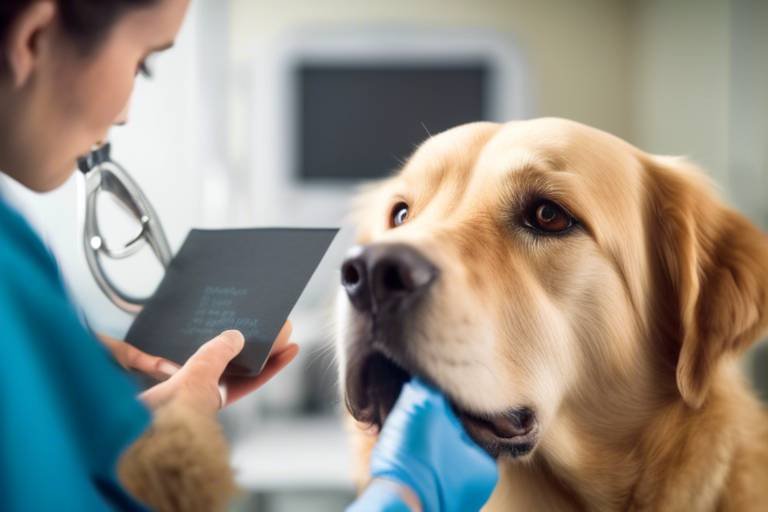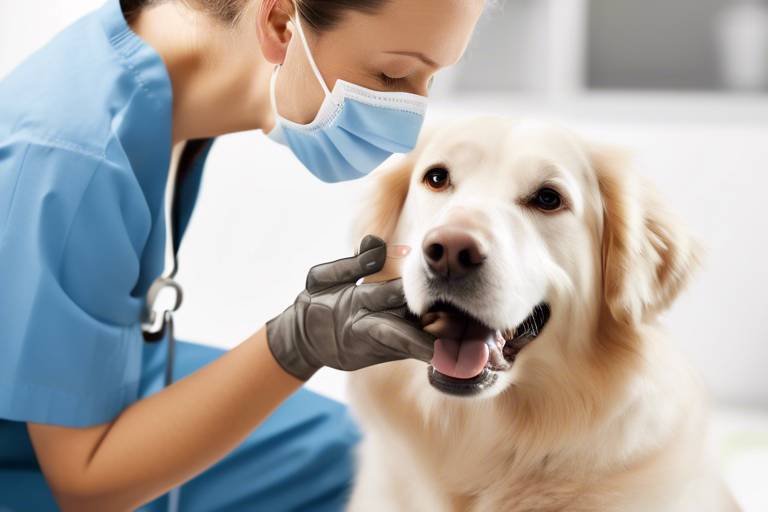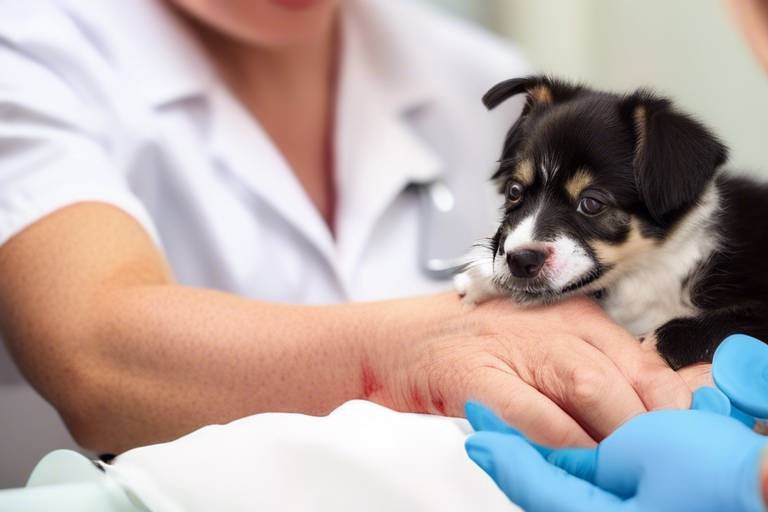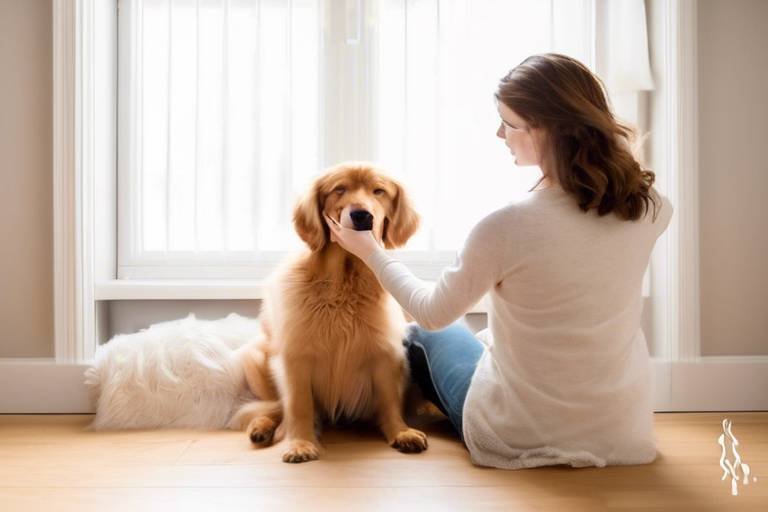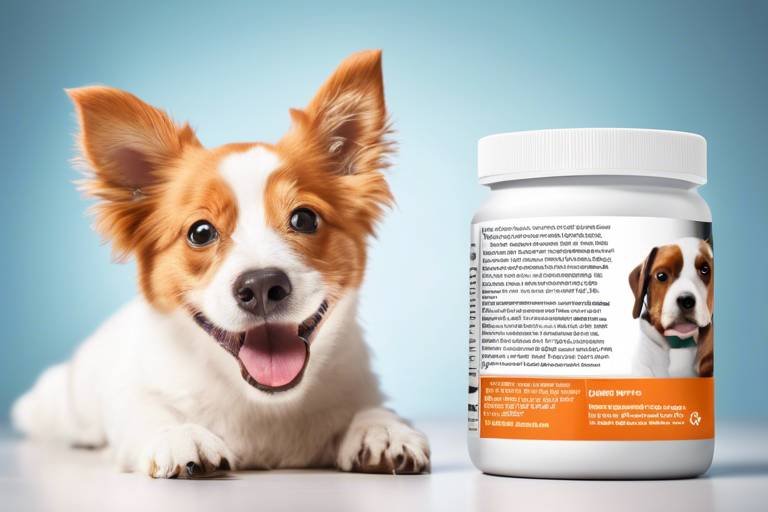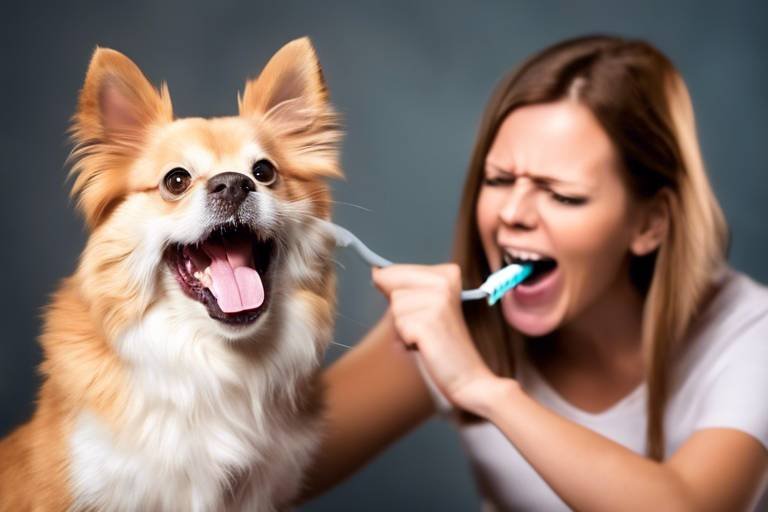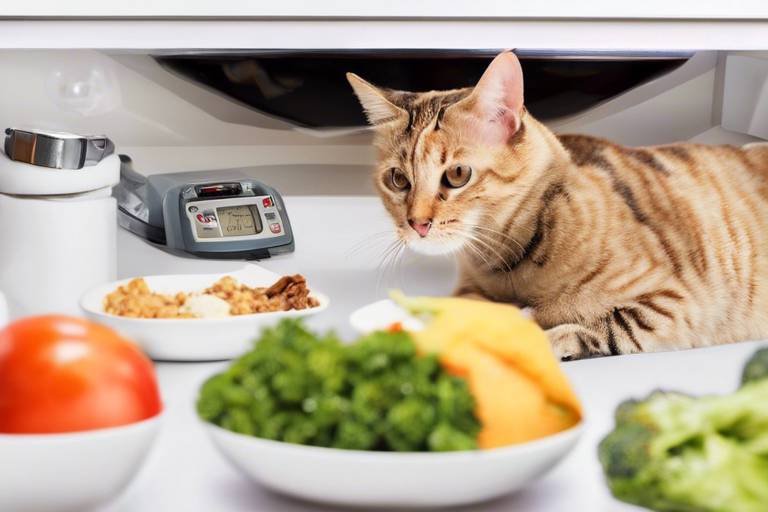The Importance of Regular Veterinary Visits for Dogs
As a dog owner, you might think of your furry friend as a part of your family, and just like any family member, they deserve the best care possible. Regular veterinary visits are not just a formality; they are a crucial aspect of maintaining your dog's health and happiness. Imagine your dog as a car; if you don’t take it for regular check-ups, it could break down at the worst possible moment. Similarly, neglecting your dog's health can lead to serious issues that could have easily been prevented with timely veterinary care.
Routine check-ups help in detecting health issues early, allowing for timely intervention. These visits are not just about vaccinations; they encompass a wide range of preventive measures that can significantly improve your dog's quality of life. Think of it as a safety net that catches potential problems before they escalate into something more serious. The peace of mind that comes with knowing your dog is healthy is priceless, and it all starts with that regular trip to the vet.
Moreover, regular veterinary visits provide an opportunity to discuss your dog's lifestyle, diet, and behavior, which are all integral components of their overall well-being. The vet can offer tailored advice based on your dog's specific needs, ensuring that they live a long, healthy, and happy life. So, if you’re still on the fence about scheduling that next appointment, consider this: every visit is an investment in your dog’s future.
Preventive care is essential for dogs, focusing on regular health checks, vaccinations, and screenings that help detect potential health issues before they become serious problems. Think of it as a shield that protects your dog from various ailments. During these visits, veterinarians can monitor your dog's weight, assess their dental health, and evaluate their overall condition. This proactive approach can save you from unexpected vet bills and heartache down the line.
Vaccinations protect dogs from various infectious diseases. Understanding the vaccination schedule and its importance can help ensure your dog remains healthy and safe throughout their life. Just like humans, dogs need vaccines to build immunity against diseases that could potentially be life-threatening. A well-planned vaccination schedule can keep your dog protected from illnesses like rabies, parvovirus, and distemper. It’s a simple yet effective way to safeguard your furry friend’s health.
Regular health screenings can identify underlying issues early on. Learn about common tests and assessments that vets recommend for dogs to maintain optimal health. These screenings often include blood tests, urinalysis, and even heartworm tests. Early detection of issues such as kidney disease or diabetes can lead to more effective treatments and a better quality of life for your dog.
Dental health is often overlooked in dogs. Regular veterinary visits include dental check-ups that can prevent serious dental diseases and improve your dog's quality of life. Just like us, dogs can suffer from plaque buildup and gum disease, which can lead to pain and other health issues if left untreated. Regular dental cleanings and assessments can keep your dog's mouth healthy and their breath fresh.
Veterinary visits provide an opportunity to discuss your dog's diet and weight. Proper nutrition is vital for preventing obesity and ensuring long-term health. A vet can help you select the right food and portion sizes based on your dog’s age, breed, and activity level. Remember, a well-fed dog is a happy dog!
Veterinarians can assess behavioral issues during visits. Early intervention can help address anxiety, aggression, or other behavioral problems, leading to a better relationship between dogs and their owners. Behavioral consultations can provide insights into what might be causing your dog's stress or aggression, allowing you to implement changes that enhance their well-being.
Parasites pose significant health risks to dogs. Regular vet visits allow for effective prevention and control strategies against fleas, ticks, and internal parasites. Your vet can recommend appropriate treatments and preventive measures that will keep your dog free from these unwanted guests, ensuring they stay healthy and comfortable.
As dogs age, their health needs change. Regular veterinary visits are crucial for monitoring and managing the health of senior dogs to ensure they live comfortably and happily. Older dogs often require more frequent check-ups to catch age-related issues like arthritis or cognitive decline. Your vet can recommend lifestyle adjustments and treatments that cater specifically to your senior dog's needs.
Understanding when to seek emergency care is vital for dog owners. Regular vet visits can help educate owners on recognizing signs of distress and preparing for emergencies. Knowing what symptoms warrant immediate attention can make all the difference in an emergency situation. Your vet can provide you with the knowledge you need to keep your furry friend safe.
- How often should I take my dog to the vet? It is generally recommended to take your dog for a check-up at least once a year, but older dogs or those with health issues may need more frequent visits.
- What should I expect during a veterinary visit? Expect a thorough examination, vaccinations, and discussions about diet, behavior, and any concerns you may have.
- Are vaccinations really necessary? Yes, vaccinations are crucial for preventing serious diseases and maintaining your dog’s health.

Understanding Preventive Care
When it comes to our furry companions, preventive care is like a superhero cape that shields them from potential health issues. Just as we schedule regular check-ups for ourselves, our dogs deserve the same attention to ensure they lead long, healthy lives. Preventive care encompasses a variety of practices, including routine health checks, vaccinations, and screenings, all aimed at identifying potential problems before they escalate into serious conditions.
Imagine your dog as a car; without regular maintenance, it could break down unexpectedly. Similarly, regular veterinary visits allow for early detection of health issues, ensuring that your dog runs smoothly through life. During these visits, veterinarians perform comprehensive examinations that can reveal hidden problems, such as heart conditions or dental diseases, that you might not notice at home.
One of the key components of preventive care is vaccinations. Vaccines act as a protective barrier against numerous infectious diseases, which can be life-threatening. Understanding the vaccination schedule is crucial because it helps you keep your dog safe from preventable illnesses. It's not just about the shots; it's about giving your dog the best chance to thrive.
Moreover, preventive care also includes regular screenings, which can range from blood tests to urine analysis. These tests can provide valuable insights into your dog's internal health, helping to catch any abnormalities early. For instance, a simple blood test can reveal issues with liver or kidney function, allowing for timely intervention. By incorporating these screenings into your dog's routine, you're investing in their long-term health.
To give you a clearer picture, here’s a brief overview of what preventive care typically includes:
| Preventive Care Component | Description |
|---|---|
| Routine Health Checks | Comprehensive examinations to assess overall health. |
| Vaccinations | Immunizations against infectious diseases. |
| Screenings | Tests to identify potential health issues early. |
| Dental Check-ups | Examinations to prevent dental diseases. |
| Weight Management | Assessing diet and weight to prevent obesity. |
In essence, preventive care is not just a checklist; it's a commitment to your dog's health and happiness. By prioritizing these visits, you're not only preventing diseases but also enhancing your dog's quality of life. Think of it as a loving investment in their future, ensuring they stay by your side for many years to come.
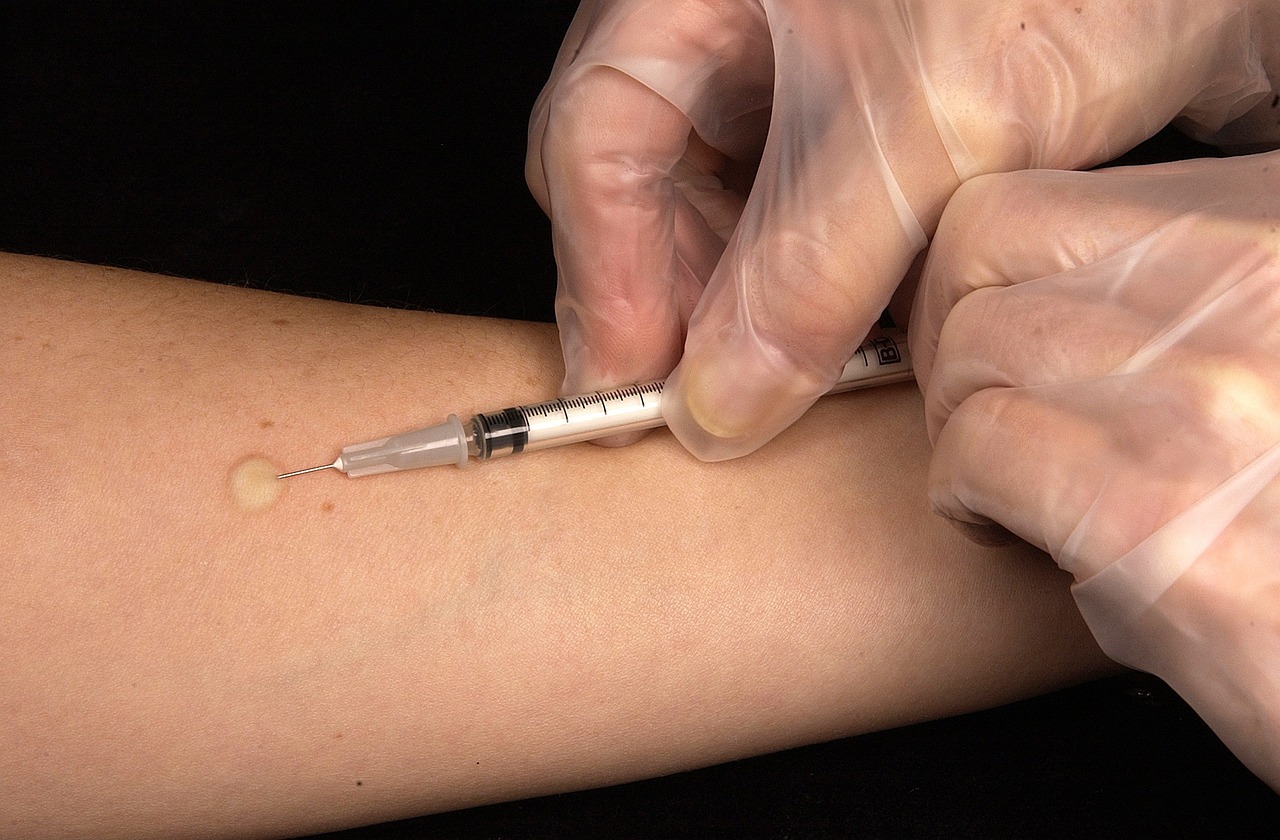
Vaccinations and Their Benefits
When it comes to keeping our furry friends safe and healthy, vaccinations play a crucial role. Just like humans, dogs are susceptible to various infectious diseases that can lead to serious health complications. This is where the magic of vaccinations comes into play. They act as a shield, protecting your dog from harmful diseases that could otherwise turn their world upside down. Imagine sending your pup out into the world without a safety net; it’s a risk no pet owner should take!
Understanding the vaccination schedule is key to ensuring your dog remains healthy throughout their life. Typically, puppies receive a series of vaccinations starting at around 6 to 8 weeks of age, followed by boosters as they grow. These early vaccinations are vital for building their immune system, preparing them to fight off diseases. For instance, core vaccines like distemper, parvovirus, and rabies are essential, but there are also non-core vaccines that can be important depending on your dog's lifestyle and environment.
| Core Vaccines | Description |
|---|---|
| Distemper | A viral disease affecting the respiratory, gastrointestinal, and nervous systems. |
| Parvovirus | A highly contagious virus that causes severe gastrointestinal illness in dogs. |
| Rabies | A fatal viral disease that affects the nervous system and is transmissible to humans. |
Beyond just preventing diseases, vaccinations can lead to a healthier, longer life for your dog. Regular vaccinations help build immunity and can prevent outbreaks of diseases that can spread quickly in community settings like dog parks or kennels. It’s like giving your dog a powerful shield against potential threats. Plus, many boarding facilities and grooming services require proof of vaccinations, making it easier for you to socialize your pup without worry.
But what happens if you miss a vaccination? Just like forgetting to renew your car insurance, it can lead to consequences. If your dog is not up-to-date on their vaccinations, they could be at risk for serious illnesses, and you may face challenges in certain situations, such as traveling or boarding. Keeping track of your dog’s vaccination schedule is not just a good idea—it's a responsible part of being a pet owner.
In addition to protecting your dog, vaccinations also play a significant role in public health. By vaccinating your pet, you help to create a herd immunity effect, which reduces the overall incidence of diseases within the community. This is particularly important for protecting vulnerable populations, such as puppies, senior dogs, and those with compromised immune systems.
In conclusion, vaccinations are not just a box to check on your to-do list; they are a vital component of your dog’s health care. Regular veterinary visits for vaccinations ensure that your furry friend stays protected against dangerous diseases, leading to a happier and healthier life. So, the next time you visit the vet, remember that those little shots are a big deal!
- How often does my dog need vaccinations? Generally, puppies need a series of vaccinations, and adults typically require boosters every 1-3 years, depending on the vaccine.
- Are there any side effects to vaccinations? Some dogs may experience mild side effects, such as lethargy or a slight fever, but serious side effects are rare.
- Can I skip vaccinations if my dog seems healthy? It’s not advisable to skip vaccinations, as they protect against diseases that can have serious consequences.

Common Health Screenings
When it comes to our furry companions, being proactive is key. Regular health screenings play a crucial role in ensuring that your dog remains in tip-top shape. These screenings are like a health report card for your pup, helping veterinarians catch potential health issues before they escalate into serious problems. Think of it as a regular maintenance check for your car; just as you wouldn’t wait for the engine to fail before getting it serviced, you shouldn’t wait for your dog to show signs of illness before scheduling a vet visit.
During these routine check-ups, veterinarians will typically perform a series of assessments that can include:
- Physical Examination: This is the bread and butter of any vet visit. The vet will check your dog's overall condition, including their coat, eyes, ears, and heart rate.
- Blood Tests: These tests can reveal a wealth of information about your dog's internal health. They can check for anemia, infections, and even organ function.
- Urinalysis: Analyzing your dog's urine can help detect urinary tract infections, kidney issues, and other metabolic conditions.
- Fecal Exam: Regular fecal testing is essential for checking for parasites that could be lurking in your dog's gut.
But wait, there’s more! Some veterinarians also recommend additional screenings based on your dog’s age, breed, and health history. For example, senior dogs may need more comprehensive blood work or screenings for conditions like arthritis or diabetes. The earlier you catch these issues, the better the chances for effective treatment. It’s like finding a crack in the foundation of your house before it turns into a full-blown structural disaster!
Moreover, these health screenings aren’t just about finding problems; they’re also a great opportunity for you as a pet owner to engage with your vet about your dog’s lifestyle. You can discuss things like:
- Dietary needs and changes
- Exercise routines
- Behavioral observations
Remember, a well-informed owner is a powerful ally in maintaining a dog’s health! By keeping an open line of communication with your veterinarian during these screenings, you can tailor a health plan specific to your dog’s needs. This not only enhances their quality of life but also deepens the bond you share with your furry friend.
Q: How often should I bring my dog in for a health screening?
A: Generally, dogs should have a check-up at least once a year. However, senior dogs or those with existing health issues may require more frequent visits.
Q: What should I do if my dog shows signs of illness between visits?
A: If you notice any unusual behavior, such as lethargy, vomiting, or changes in appetite, it’s important to contact your veterinarian immediately.
Q: Are health screenings expensive?
A: While costs can vary, investing in regular health screenings can save you money in the long run by preventing more serious health issues and expensive treatments.

Dental Health and Hygiene
When it comes to our furry friends, dental health is often an area that gets overlooked. Just like humans, dogs can suffer from a variety of dental issues, ranging from mild tartar buildup to severe periodontal disease. Regular veterinary visits play a crucial role in maintaining your dog's dental hygiene, ensuring that their teeth and gums remain healthy. Think of it as a spa day for their mouth! During these visits, veterinarians can perform thorough dental cleanings, check for signs of disease, and offer guidance on at-home care.
Did you know that dental disease can lead to more than just bad breath? Bacteria from the mouth can enter the bloodstream, potentially affecting the heart, liver, and kidneys. This makes it essential to address dental issues early on. Routine check-ups allow vets to identify any problems and recommend treatments before they escalate. It’s like catching a small leak in your roof before it turns into a flood!
Many dog owners might wonder what a typical dental check-up entails. Here’s a sneak peek:
| Procedure | Description |
|---|---|
| Visual Examination | The vet inspects the gums, teeth, and mouth for signs of disease. |
| Dental Cleaning | Professional cleaning to remove plaque and tartar buildup. |
| X-rays | X-rays may be taken to check for underlying issues, such as root infections. |
| Preventive Care Advice | Veterinarians provide tips for at-home dental care, such as brushing techniques and recommended dental chews. |
In addition to regular vet visits, establishing a dental care routine at home is vital. Here are some tips to keep your dog's teeth sparkling clean:
- Brush Regularly: Aim to brush your dog's teeth several times a week, if not daily. Use toothpaste designed for dogs, as human toothpaste can be harmful.
- Dental Chews: Provide dental chews that help reduce plaque and tartar buildup while satisfying their chewing instincts.
- Water Additives: Consider using water additives that promote oral health and freshen breath.
By prioritizing your dog's dental health, you're not just improving their breath; you're enhancing their overall quality of life. A healthy mouth can lead to a happier, more active dog who enjoys playing, eating, and snuggling with you without discomfort. So, the next time you schedule a vet visit, remember that dental health is a key component of your dog's well-being. It’s an investment in their happiness that pays off in wagging tails and joyful barks!
Q: How often should I take my dog for dental check-ups?
A: It's generally recommended to have your dog's teeth checked at least once a year, but some dogs may require more frequent visits depending on their dental health.
Q: Can I brush my dog's teeth at home?
A: Absolutely! Regular brushing at home is highly encouraged. Just make sure to use toothpaste specifically formulated for dogs.
Q: What are the signs of dental disease in dogs?
A: Common signs include bad breath, swollen gums, difficulty eating, and excessive drooling. If you notice any of these, it's time for a vet visit!

Nutrition and Weight Management
When it comes to our furry companions, nutrition and weight management are two of the most critical aspects of their overall health. Just like humans, dogs require a balanced diet tailored to their specific needs, which can vary based on factors such as age, breed, and activity level. Regular veterinary visits provide an excellent opportunity to discuss your dog's dietary requirements with a professional who understands the nuances of canine nutrition. After all, what goes into their bowl can significantly affect their health, energy levels, and longevity.
Imagine feeding your dog the equivalent of fast food every day. While they might enjoy the taste, over time, this could lead to serious health issues like obesity, diabetes, or even heart disease. That's why it's essential to consult with your veterinarian about the best diet for your dog. They can help you understand the importance of high-quality ingredients and how to read pet food labels effectively. This knowledge ensures you're providing your dog with the nutrients they need to thrive.
During your vet visits, you can also discuss your dog's weight. Obesity is a growing concern for dogs, with studies showing that a significant percentage of pets are overweight. This can lead to a host of health problems, including joint issues, respiratory difficulties, and a decreased lifespan. Your veterinarian can help you determine your dog's ideal weight and develop a plan to achieve and maintain it. This plan may include:
- Adjusting portion sizes
- Choosing the right type of food
- Incorporating regular exercise into your dog's routine
To further assist in managing your dog's weight, your vet may recommend specific feeding strategies. For instance, they might suggest feeding your dog smaller, more frequent meals throughout the day rather than one large meal. This approach can help regulate their metabolism and keep them feeling satisfied without overindulging.
It's also beneficial to monitor your dog's body condition score (BCS). This scoring system helps assess whether your dog is underweight, ideal, or overweight based on their physical appearance and feel. Your veterinarian can guide you on how to evaluate your dog's BCS during routine check-ups, ensuring you're always aware of their weight status.
Remember, maintaining a healthy weight is not just about aesthetics; it significantly impacts your dog's quality of life. A well-nourished dog is more energetic, playful, and less prone to health issues. So, the next time you visit the vet, don't hesitate to ask about your dog's nutrition and weight management. It could be the key to unlocking a longer, happier life for your beloved pet!
- How often should I take my dog to the vet for weight management?
It's recommended to have a check-up at least once a year, but if your dog is overweight, more frequent visits may be necessary to monitor progress. - What are some signs that my dog may be overweight?
Look for difficulty in exercising, noticeable fat deposits, and an inability to feel their ribs easily when you touch their sides. - Can I feed my dog human food?
Some human foods are safe for dogs, but many are not. Always consult your vet before introducing new foods into your dog's diet.

Behavioral Assessments
When you think about taking your dog to the vet, you might picture vaccinations, check-ups, or maybe even a quick weigh-in. But what about the mental health of your furry friend? Just like us, dogs can experience a range of emotions and behavioral issues that can affect their overall well-being. That’s where come into play during regular veterinary visits. These assessments are essential for identifying any underlying issues that may not be immediately visible but could impact your dog’s happiness and health.
Imagine your dog as a complex puzzle; each piece represents different aspects of their life, including their physical health, emotional state, and social interactions. A behavioral assessment is like a magnifying glass that allows veterinarians to examine those pieces closely. They can help identify signs of anxiety, aggression, or other behavioral problems that may stem from various factors like changes in environment, past trauma, or even health issues. For example, if your dog suddenly starts barking excessively or hiding when visitors come over, it may indicate a deeper issue that needs addressing.
During a behavioral assessment, your vet will typically ask a series of questions to gauge your dog’s behavior in different situations. They may inquire about:
- How your dog interacts with other pets and people
- Any changes in behavior you’ve noticed
- Your dog’s response to new environments or experiences
- Feeding habits and routines
This comprehensive approach allows the vet to gather a holistic view of your dog’s behavior, leading to more effective solutions. For instance, if your dog shows signs of separation anxiety, your vet might recommend specific training techniques or even suggest consulting a professional dog trainer or behaviorist. The goal is to ensure that your dog leads a happy and fulfilling life, free from unnecessary stress and anxiety.
Moreover, early intervention is key. Just like we wouldn’t ignore persistent headaches or mood swings, we shouldn't overlook behavioral changes in our pets. Addressing these issues early on can prevent them from escalating into more serious problems. Think of it this way: if you catch a small leak in your roof, you’ll want to fix it before it turns into a waterfall cascading through your living room!
In conclusion, including behavioral assessments in your dog’s routine veterinary visits is not just a good idea; it’s a vital component of their health care. By paying attention to your dog’s mental and emotional needs, you can foster a better relationship with them and ensure they thrive in your care. Remember, a happy dog equals a happy owner!
Here are some common questions that dog owners often have regarding behavioral assessments:
- How often should I have my dog's behavior assessed? It’s recommended to discuss behavioral assessments during annual check-ups, but if you notice any changes, don’t hesitate to bring it up sooner.
- What should I do if my dog shows signs of aggression? Consult your veterinarian immediately. They can help assess the situation and guide you on the next steps.
- Can behavioral issues be treated? Yes! Many behavioral issues can be managed effectively with proper training, environmental changes, and sometimes medication.
- Is it normal for dogs to have anxiety? Yes, many dogs experience anxiety due to various factors. Regular assessments can help address these issues early.

Parasite Prevention and Control
When it comes to keeping our furry friends healthy, should be at the top of the list. Dogs can be vulnerable to a variety of parasites, including fleas, ticks, and internal worms, which can lead to serious health issues if left unchecked. Imagine your dog, full of energy and joy, suddenly becoming lethargic or unwell due to a hidden parasite. It's a scenario no pet owner wants to face, but the good news is that regular veterinary visits can help you stay one step ahead.
During your dog's routine check-ups, your veterinarian will conduct thorough examinations to check for signs of parasite infestations. This includes looking for fleas and ticks on the skin and performing stool tests to detect internal parasites like roundworms and hookworms. Early detection is key, as it allows for prompt treatment and reduces the risk of complications. In fact, some parasites can transmit diseases to both dogs and humans, making it essential to keep up with preventive measures.
So, what can you do to protect your dog from these pesky invaders? Here are some effective strategies:
- Regular Preventive Medications: Administering veterinarian-recommended flea and tick preventatives is crucial. These can come in various forms, such as topical treatments, oral medications, or collars. Consult your vet to find the best option for your dog.
- Routine Testing: Annual fecal examinations can help identify any internal parasites that may not show obvious symptoms. This proactive approach allows for timely treatment.
- Maintain a Clean Environment: Keeping your home and yard clean can significantly reduce the risk of parasite infestations. Regularly cleaning your dog's bedding and vacuuming your living space can help eliminate potential breeding grounds.
- Regular Grooming: Brushing your dog's coat and checking for any signs of fleas or ticks during grooming sessions can help catch infestations early.
It's also important to understand the life cycles of common parasites. For instance, fleas can lay hundreds of eggs in a short time, making it easy for an infestation to spiral out of control. Ticks, on the other hand, can transmit diseases like Lyme disease and Rocky Mountain spotted fever, which can have serious health implications for your dog. By staying informed and proactive, you can ensure your dog remains healthy and happy.
In addition to these preventive measures, your veterinarian may recommend specific vaccinations that can help protect against diseases transmitted by certain parasites. This comprehensive approach to parasite control not only safeguards your dog’s health but also contributes to the well-being of your entire family.
In conclusion, regular veterinary visits play a pivotal role in parasite prevention and control. By working closely with your veterinarian and implementing a proactive approach, you can help your dog lead a parasite-free life. Remember, a happy dog is a healthy dog, and keeping those pesky parasites at bay is a significant part of that equation!
Q: How often should I take my dog to the vet for parasite control?
A: It's recommended to take your dog for a check-up at least once a year, but more frequent visits may be necessary for dogs at higher risk of parasite exposure.
Q: Can I use over-the-counter products for flea and tick prevention?
A: While some over-the-counter products can be effective, it's best to consult your veterinarian for recommendations tailored to your dog's specific needs and health conditions.
Q: What are the signs that my dog may have a parasite?
A: Common signs include itching, hair loss, lethargy, vomiting, diarrhea, and weight loss. If you notice any of these symptoms, consult your veterinarian immediately.
Q: Are there any home remedies for parasite prevention?
A: Some home remedies may help, but they are often less effective than veterinary-approved treatments. Always discuss any home remedies with your veterinarian before trying them.

Senior Dog Care
As our furry companions age, their health needs evolve significantly. It's like watching a child grow; just as their needs change, so do those of our beloved dogs. Regular veterinary visits become even more crucial during this stage of life. These check-ups are not just routine; they are essential for monitoring and managing various health conditions that can arise as dogs enter their golden years.
Senior dogs often face a host of health challenges, including arthritis, dental disease, kidney issues, and heart problems. By scheduling regular vet visits, you can help detect these issues early, allowing for timely intervention. Think of it as catching a small crack in the foundation of your house before it turns into a major structural problem. Moreover, your vet can provide tailored advice on how to modify your dog's diet and exercise regimen to suit their aging body.
During these visits, veterinarians typically perform comprehensive examinations that include:
- Weight Management: Keeping an eye on your dog's weight is vital. Obesity can exacerbate many health problems, so your vet will help you determine the ideal weight for your senior dog.
- Joint Health Assessments: Many older dogs suffer from arthritis or joint pain. Your vet may recommend joint supplements or medications to ease discomfort and improve mobility.
- Blood Work and Screenings: Routine blood tests can help identify underlying issues like kidney or liver disease before they become severe.
Additionally, dental health is another critical aspect of senior dog care. As dogs age, they become more susceptible to dental diseases, which can lead to pain and other serious health problems. Regular dental check-ups and cleanings can prevent these issues, ensuring your dog maintains a healthy mouth and a happy demeanor.
It's also essential to consider the emotional well-being of senior dogs. They may experience anxiety or depression as they age, especially if they lose a companion or experience changes in their environment. Regular vet visits provide an opportunity to discuss any behavioral changes you may notice, allowing for early intervention and support.
In conclusion, senior dog care is a multifaceted approach that requires vigilance and proactive measures. By prioritizing regular veterinary visits, you can ensure that your aging dog receives the best possible care, ultimately enhancing their quality of life and allowing them to enjoy their golden years to the fullest. Remember, a happy dog is a healthy dog, and your commitment to their well-being speaks volumes about the love you share.
| Question | Answer |
|---|---|
| How often should I take my senior dog to the vet? | It's recommended to visit the vet at least every six months for senior dogs, as their health can change rapidly. |
| What are common signs of aging in dogs? | Look for changes in behavior, mobility issues, weight fluctuations, and changes in appetite or drinking habits. |
| Can diet affect my senior dog's health? | Absolutely! A balanced diet tailored to your dog's age and health conditions can significantly improve their quality of life. |

Emergency Preparedness
When it comes to our furry friends, being prepared for emergencies is not just a good idea; it’s essential. Imagine this: Your dog suddenly collapses or starts showing signs of distress. What do you do? Panic can set in quickly, but if you've been proactive during those routine veterinary visits, you’ll be better equipped to handle such situations. Regular check-ups not only keep your dog healthy but also educate you on recognizing warning signs that something might be wrong.
During these visits, your veterinarian can provide valuable insights into what constitutes an emergency for your dog. For instance, knowing the difference between a minor issue and a critical one can save precious time. Some common emergencies include:
- Severe vomiting or diarrhea
- Difficulty breathing
- Uncontrolled bleeding
- Seizures
- Signs of pain or distress
Being aware of these signs can make all the difference. Furthermore, your vet can help you create an emergency plan tailored to your dog's specific needs. This plan may include a list of emergency contacts, including your veterinarian’s after-hours number and the nearest emergency animal clinic. It’s a good idea to keep this information easily accessible—perhaps on your fridge or in your phone.
Additionally, consider assembling an emergency kit for your dog. This kit should contain essential items such as:
- First aid supplies (bandages, antiseptic wipes, etc.)
- Copies of medical records and vaccination history
- Emergency contact information
- Medications your dog may need
- A comfortable blanket or favorite toy to provide comfort
Lastly, don’t underestimate the power of knowledge. Regular veterinary visits can also provide you with information on local resources, such as pet-friendly hotels or shelters in case of a natural disaster. Being well-informed can help alleviate stress during an emergency, allowing you to focus on what matters most—your dog's safety and well-being.
Q: How often should I take my dog to the vet for check-ups?
A: It's generally recommended to take your dog for a check-up at least once a year. However, if your dog is older or has specific health issues, more frequent visits may be necessary.
Q: What should I do in case of an emergency?
A: Stay calm and assess the situation. If your dog is in distress, contact your veterinarian or an emergency animal clinic immediately. Having an emergency plan in place will help you act quickly.
Q: What are some signs that my dog might need emergency care?
A: Look for signs such as difficulty breathing, severe vomiting or diarrhea, seizures, uncontrolled bleeding, or any sudden change in behavior. If you’re unsure, it’s always better to err on the side of caution.
Q: Can regular vet visits help prevent emergencies?
A: Absolutely! Regular check-ups allow for early detection of potential health issues, which can often prevent emergencies from arising in the first place.
Frequently Asked Questions
- Why are regular veterinary visits important for my dog?
Regular veterinary visits are crucial for maintaining your dog's health. They help in early detection of potential health issues, ensure vaccinations are up to date, and provide an opportunity for preventive care that can save your dog from serious illnesses down the line.
- What is included in a typical veterinary check-up?
A typical veterinary check-up includes a thorough physical examination, vaccinations, dental check-ups, and discussions about nutrition and weight management. Your vet may also recommend specific screenings based on your dog's age, breed, and health history.
- How often should I take my dog to the vet?
Generally, it's recommended to take your dog for a veterinary check-up at least once a year. However, puppies, senior dogs, or those with health issues may require more frequent visits. Your vet will help determine the best schedule for your furry friend.
- What vaccinations does my dog need?
Dogs typically need core vaccinations such as rabies, distemper, parvovirus, and adenovirus. Non-core vaccinations may include those for Bordetella (kennel cough) and Lyme disease, depending on your dog's lifestyle and exposure risks. Your veterinarian will provide a tailored vaccination schedule.
- How can I keep my dog's teeth healthy?
Maintaining your dog's dental health involves regular veterinary check-ups that include dental cleanings and assessments. Additionally, you can brush your dog's teeth at home, provide dental chews, and feed a diet that supports oral health.
- What should I do if my dog is overweight?
If your dog is overweight, consult your veterinarian for a tailored weight management plan. This may include dietary changes, portion control, and increased exercise. Regular vet visits can help monitor your dog's progress and adjust the plan as needed.
- How can I recognize signs of distress in my dog?
Signs of distress in dogs can include excessive barking, panting, hiding, aggression, or changes in eating habits. Regular veterinary visits can help educate you on recognizing these signs and what actions to take, ensuring your dog remains healthy and happy.
- What should I know about caring for a senior dog?
Caring for a senior dog involves more frequent veterinary visits to monitor health changes, adjusting their diet, and providing joint support. Regular check-ups help in managing age-related health issues, ensuring your senior dog enjoys their golden years comfortably.
- How can I prevent parasites in my dog?
Preventing parasites involves regular veterinary check-ups that include preventive treatments for fleas, ticks, and worms. Your veterinarian can recommend the best preventive products based on your dog's lifestyle and the region you live in.

